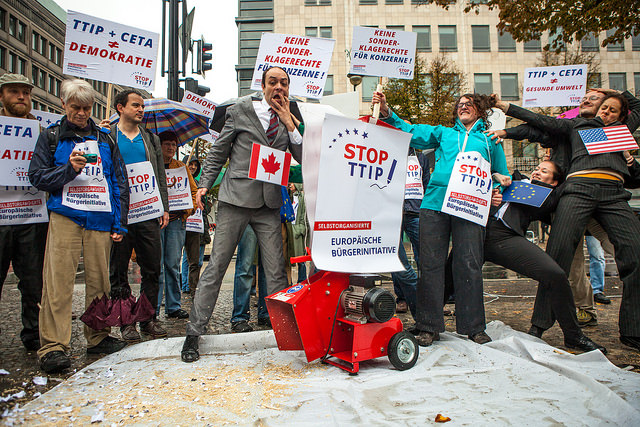In light of the latest NAFTA Chapter 11 decision to go against Canada, I was asked to put together some background notes for our Unifor leadership on this bizarre quasi-judicial kangaroo court system. Here they are, in case they are useful for anyone else getting up to speed on the whole investor-state dispute system.
Some very good and more detailed resources on the subject include:
The latest update from Scott Sinclair at the CCPA, who has painstakingly catalogued all the NAFTA Chapter 11 claims, and documented that Canada definitely hold the “most sued” award. An interesting report from UNCTAD (referenced below) which highlights the worldwide nature of ISDS provisions, the accelerating pace of claims launched, and the frequency of successful claims.
Here are the briefing notes:
- Investor-state dispute settlement (ISDS) is a quasi-judicial arbitration system whereby companies can sue national governments for perceived violations of various free-trade and investor freedom commitments.
- The most infamous example of this system have been experienced under NAFTA, which was one of the first trade deals to spell out these special powers (in its Chapter 11).
- In the first two decades of NAFTA, 77 claims were launched under Chapter 11’s ISDS system (as reported by the CCPA report cited above). Thirty-five of them were against Canada (more than any other country). Of those, at least nine have been settled (either through arbitration or through out-of-court agreements) against Canada, with total monetary damages now approaching $200 million.
- Claims against Canada under Chapter 11 have been accelerating: 24 of the claims against Canada have been launched in the last decade (since 2005), representing 70 per cent of all Chapter 11 claims. Within NAFTA’s kangaroo court system, it is clear that Canada is the favoured “target.”
- The most recent Chapter 11 judgment awards $17 million to ExxonMobil and Murphy Oil in compensation for a provision of the 1985 Atlantic Accord energy agreement, which requires oil-producing companies to conduct minimal R&D in Newfoundland as a condition of their production license. Note that the Atlantic Accord pre-dates NAFTA. Also, the companies had sued Newfoundland in Canadian court to protest the requirement … and lost. So Chapter 11 provided an alternate (and more business-friendly) way to press their same claims.
- Past Chapter 11 judgments or out-of-court settlements against Canada include: $130 million awarded to Abitibi-Bowater for Newfoundland’s expropriation of land and water rights from a pulp mill that the company closed in 2008 (the affected workers were members of the CEP, now part of Unifor); an out-of-court settlement with Ethyl Corp. over a Canadian ban on import and sale of MMT, a chemical additive in gasoline; and a suit by Dow regarding Quebec government claims regarding the safety of the pesticide 2,4-D.
- The actions currently being pursued against Canada include a total of $6 billion in additional claims, for a range of measures: including Quebec’s ban on natural gas fracking; several aspects of Ontario’s Green Energy Act; Canada’s support for building a second bridge crossing at Windsor-Detroit; and the federal government’s invalidation of a drug patent for a product that was clinically shown to be not useful.
- ISDS provisions are now included in many other free trade and international investment agreements. So while NAFTA unfortunately helped to pioneer the process, unfortunately it is no longer unique.
- One especially dangerous ISDS provision is contained in the recently implemented Canada-China FIPA (Foreign Investment Protection Agreement). It provides Chinese companies with access to a quasi-judicial ISDS provision for a minimum of 31 years (even if a subsequent Canadian government reneges on the treaty).
- Globally, over 530 ISDS claims were launched between 2000 and 2013, according to the United Nations Conference on Trade and Development. The rate of ISDS claims has accelerated (averaging over 50 per year since 2011). Globally, most ISDS claims result in awards or out-of-court settlements against the “offending” governments.
- Proposals to include ISDS in the proposed Canada-Europe CETA have been highly controversial, especially in Europe. Millions of Europeans have signed petitions against any ISDS provision in CETA (or in the similar agreement being negotiated with the U.S.), and several EU-member governments have now said they will not endorse a CETA that includes ISDS. But Canada’s government remain determined to include this anti-democratic feature in the agreement.
- ISDS raised enormous questions of democracy, accountability, and rule of law. The idea was supposedly justified originally by foreign investor concerns that their assets would be jeopardized by unilateral action from undemocratic “third world” governments. But the repeated use of ISDS against Canada and other countries with mature, reliable legal systems confirms that is not the motive. ISDS provides corporations with an undemocratic appointed business-friendly forum in which to press their claims against any government action seen as unfavourable to profits.
- The regular use of ISDS has an additional “chill” effect on government policy-making, that extends beyond the actual judgments that have been awarded. Governments are now even more reluctant to take any measures opposed by business, for fear of being called before this “kangaroo court” system.
- An additional complication in Canada arises from the fact that many ISDS actions have been launched against provincial governments, which cannot be constitutionally liable for provisions of an international trade treaty. Thus there is some legal and fiscal uncertainty about who would have to pay ISDS judgments against provincial governments. The Harper government has paid for some past judgements that went against provincial governments (most notably the big Abitibi-Price award), but wants to make it clear the provinces will be on the hook for future judgments (including under CETA). The provinces are resisting, and with good reason.
Jim Stanford is an economist with Unifor.
Photo: Jakob Huber/ECI Stop TTIP!/flickr



